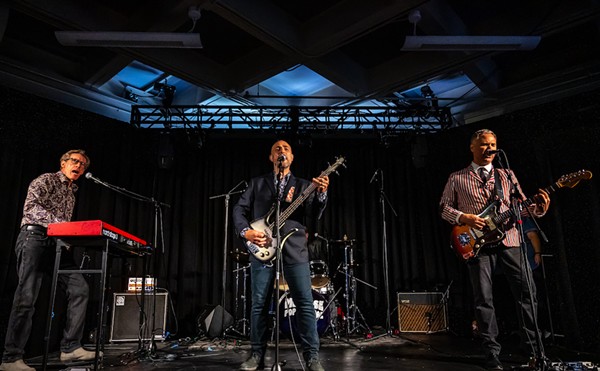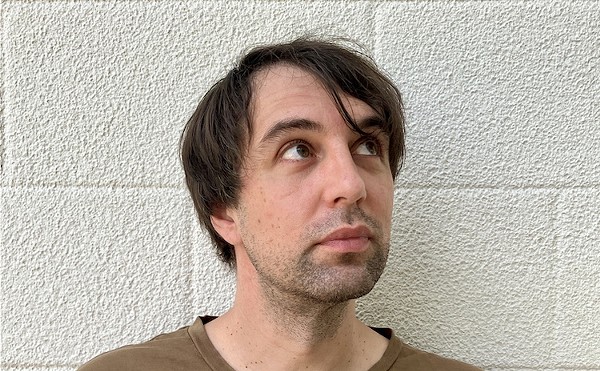David Bazan
; with Say Hi
; 8 p.m. Tuesday, Oct. 13
; The Social, 407-246-1419
; all ages
; $12-$14
‘I hear that you don't change/And how do you expect to keep up with the trends?/You won't survive the information age/Unless you change the truth to accommodate the brilliance of men." – Pedro the Lion, "Letter From a Concerned Follower," 1999.
;"Somebody put it on Twitter," says David Bazan, the former Pedro the Lion frontman. "‘Is God going to change the truth to accommodate the brilliance of David Bazan?' That was like, pow, gotcha. I thought that was pretty witty."
;There was a time not so long ago that Bazan stood atop the Christian indie rock world. As the voice and soul of the Seattle-based group from 1997 to 2004, Bazan gave voice to a generation of young and faithful, those mired in doubt and disenchanted with organized religion or the established church, but seeking a relationship with God nonetheless.
;"I think at the time I was very idealistic," Bazan, now 33, says of PTL's beginnings. Although he'd grown up in a devoutly Pentecostal family, he says that he didn't take Christianity that seriously yet. "I was going to try to make it my own."
;Along the way, Pedro the Lion's sometimes sweet, sometimes jaded analyses of faith, God and sin, set to ornate melodies and simple – but not simplistic – arrangements, won over scores of secular fans. Bazan wrote records that, in his words, "communicated a sense of alienation and of being disenfranchised from the church. A sense of longing to have a pure and loving relationship with God."
;But as his band evolved, so did Bazan's lyrics. Words that once embraced scripture took on a bitter tone. Bazan and the band he helmed were changing. It was a slow, gradual change fraught with self-doubt and battles with excessive drinking, but it would end with Bazan becoming a sort of unintentional agnostic apologist, culminating in last month's release of his first full-length solo LP, Curse Your Branches.
;The record is the masterpiece of Bazan's career, a deeply emotional invective to a God that Bazan is no longer sure exists, yet can't seem to completely sever ties with. It is, in so many words, a break-up letter to Jesus, the harsh and biting words of a man who has rejected that which he was taught to hold dear. It's at once an artistic, theological and political statement, an agnostic manifesto.
;"It's all over the map," Bazan says of the reaction to his new record. "Some people are frustrated by it. Some people are comforted by it. Most of the frustrated people are perfecting Christians who are frightened by it. From atheists to Christian people who are comforted by the doubting that they think is a part of faith, the response has been interesting. The range of the conversation is ; very different."
;Pedro the Lion's debut EP, Whole, told of God's unwavering forgiveness, even in the face of human foibles and shortcomings. The band's second and third efforts showed Bazan still very much adhering to the faith, offering moments of fervent praise and worship alongside tales of the fallen and their quest for divine perfection.
;By 2000's Winners Never Quit, however, the tone had started to shift. By then, Bazan says, he was frustrated by the hypocrisy he perceived among the faithful. Winners offered a direct critique, framed as the haunting story of two brothers: one an ostensibly righteous pillar of his community and a man who would do anything to obtain and maintain power; the other, a drunken loser and embarrassment to his prominent family.
;With the follow-up, 2002's Control, PTL veered into overtly political territory. Perhaps the band's most visceral effort, Control was a musical screed against American materialism and excess, inspired by the 1999 protests against the World Trade Organization in Bazan's hometown. "Rapture" literally sang adultery's praises. "Indian Summer" wistfully longed for the day when there'd be no more rain; this would, as the song blithely notes, "do wonders for the GNP."
;But it wasn't until the final Pedro record, Achilles Heel, that Bazan's cynicism toward his parents' faith reached its zenith. From Achilles' most poignant track, "Foregone Conclusions": "You were too busy steering the conversation toward the Lord/To hear the voice of the Spirit begging you to shut the fuck up/You thought it must be the devil trying to make you go astray/Besides, it couldn't have been the Lord because you don't believe he talks that way."
;It's almost hard to believe the same guy who wrote "Foregone Conclusions" had, just a few years earlier, penned "Lullaby" ("It's because I know I'm understood when I hear Him say/Rest in me, little David/And dry all your tears") or "Promise" ("If I look up and the sky's not there/Is there any reason that I should be scared?"). And yet, looking retrospectively at the decade-long arch of Pedro the Lion, the trajectory of Bazan's relationship with God and Christianity is abundantly clear – and it's not in the direction his hordes of youth-group followers would have preferred.
;"Well, it happened gradually," says Bazan. "There was a point in time where it first started, and where the terminology seemed a little bit meaningless to me. Especially during the Bush administration, the terminology itself – I started thinking outside of the box with the label. I don't need to self-identify as a Christian to identify with this set of ideas."
;The presumed causal link between religion, conservatism, anti-intellectualism, merciless capitalism and warmongering that seemed to permeate Christian America during the Bush terms was, Bazan says, too much for him. If that was what Christianity was, he didn't want to be associated with it. But he hadn't rejected the faith itself per se – merely its practitioners. Even then, he says, he still drifted away. By the 2004 release of Achilles Heel, Bazan hadn't attended church in two or three years.
;"I had a little bit of the Michael Scott syndrome," says Bazan. "I was lonely and I wanted buddies." In 2005, Bazan had something of a flameout. He disbanded Pedro the Lion, which had a constantly shifting lineup throughout its existence, but in its last incarnation had narrowed to Bazan and longtime collaborator T.W. Walsh. "I couldn't do it. It didn't work. I had to get off the train."
;There was no grand reason for the band's demise; as Bazan describes it, it was more death by a thousand paper cuts. That year, Bazan was ejected from Cornerstone, a big annual Christian music festival in Illinois, for chugging vodka from a milk carton.
;In 2006, Bazan released a solo EP, Fewer Moving Parts. He did tours of fans' living rooms to make money while preparing the record and, in July, resurfaced at Cornerstone with a new batch of antagonistic tunes, including eventual album-closer "In Stitches," which ranks among Bazan's best compositions. It charts both the singer's disillusionment with God and his unwillingness to concede that the deity doesn't exist.
;"It was the major ideas that I soured on first," says Bazan. "This album is obsessed with [the concept of] original sin," or the idea that Adam and Eve's sin condemned humanity to a lifetime of turmoil, and "the threat of hell hanging over my head like a halo," as he says on "When We Fell."
;After that, Bazan began to re-evaluate other fundamentalist teachings of his youth. "After the fact, I kind of looked at all that stuff again. ‘Oh my goodness, a talking snake?'" But his main beef with the almighty, which surfaces over and over again, is the idea that God would create humanity knowing good and well that they would fail.
;"When We Fell" offers this indictment: "When you set the table/When you chose the scale/Did you write a riddle/That you knew they would fail?"
;"It really does get to the motivation and the responsibility that a creative being has to its creation," he says. "There's an analogy to parenthood that comes ; to bear."
;In short, Bazan refuses to believe in a God that would act this way. Then again, he also can't quite let go. The almost mournful finale, "In Stitches," drives the point home: "The crew have killed the captain/But they still can hear his voice."
;As that song, and the record, reaches its defiant conclusion, there's no escaping the long road Bazan has traveled, from the young man who chided those who challenged the word of God to the adult who does ; so unflinchingly.
[email protected]


















